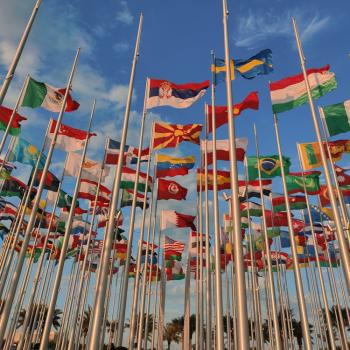
The world was established with enough resources so that everyone could and should be able to use them to have their needs fulfilled. The goods of the earth are meant to be used by all, which leads to the teaching that there is to be a universal destination or distribution of goods:
Whether believers or not, we are agreed today that the earth is essentially a shared inheritance, whose fruits are meant to benefit everyone. For believers, this becomes a question of fidelity to the Creator, since God created the world for everyone. Hence every ecological approach needs to incorporate a social perspective which takes into account the fundamental rights of the poor and the underprivileged. The principle of the subordination of private property to the universal destination of goods, and thus the right of everyone to their use, is a golden rule of social conduct and “the first principle of the whole ethical and social order.”[1]
While there are many ways to explain and justify the teaching of the universal destination of goods, its Christian formulation lies with the belief that God created the world in such a way that its goods would be freely used by all:
God gave the earth to the whole human race for the sustenance of all its members, without excluding or favouring anyone. This is the foundation of the universal destination of the earth’s goods. The earth, by reason of its fruitfulness and its capacity to satisfy human needs, is God’s first gift for the sustenance of human life.[2]
Many people circumvent the universal distribution of goods by accumulating excessive wealth for themselves, using a little of that excess to create the tools they need to collect and take even more from the world’s resources than is just or right. Indeed, they hoard up as much wealth as they can, turning their hoards into dams which prevent the universal distribution of goods. When positive law not only permits, but helps the rich to get richer at the expense of the needs of others, the legal system is unjust and needs to be reformed. And it must be made clear, despite the way the rich have gamed the system so that it is possible for their actions to be perfectly legal, their actions must not be seen as fair or just, as their actions and objectives go against basic ethical principles. Indeed, it has been clear for centuries, no matter how the rich like to portray themselves and the way they gained their wealth, “money is not accumulated by one person except by means of another person’s loss and harm.” [3] Greed influences most of those who are rich so that no matter how much they have accumulated, they want more, and they will do what they can with what they have to make sure they get what they want. Of course, they are not alone in this, it is a universal phenomenon for people to want more than they need, as the Chinese philosopher Xunzi wrote:
The natural disposition of people is that for food they want meats, for clothes they want embroidered garments, for travel they want chariots and horses, and moreover they want the riches of surplus wealth and accumulated goods. Even if provided these things, to the end of their years they would never be satisfied; this is also the natural disposition of people. [4]
While Christians should say it is not human nature as it was created, but how it became perverted and corrupted due to sin, which leads to this almost universal expression of greed, Xunzi highlighted a phenomenon which we have to deal with in society: the way avarice works and turns people away from the common good. This is why society must put in place policies and procedures which work against greed, against the way greed disrupts the universal distribution of goods, making sure its most grievous violations are dealt with first. The rich have not gained their wealth as fairly as they try to claim; they hide the underhanded ways they use to accumulate it and keep the goods of the earth away from those in need. They are the ones who are most responsible for the consequences which follow when the universal destination of goods is circumvented. This is why society should focus on the rich more than others when trying to rectify the imbalance. Since they are the ones who created the most burdens for society, society is justified if it has to take action against them, taking their hoarded wealth and redistributing it so as to undo the harm they have caused by blocking the universal distribution of goods. This is why President Biden’s desire to tax the ultra-rich is a step in the right direction:
As part of its budget proposal for fiscal year 2023, the Biden administration is pushing a measure that seeks to ensure that those worth more than $100 million pay a federal income tax rate of at least 20% on their income, including unrealized gains on assets — which are not currently taxed.[5]
In part, Biden’s proposal must be seen in response to the way the ultra-rich have found ways to ignore their responsibility to society and hid their wealth so as to pay less taxes than they already should, as Paul Kiel, Jesse Eisinger and Jeff Ernsthausen explained:
Last year ProPublica, drawing on a trove of IRS data, gave the public its most extensive view ever of the taxes of the wealthiest Americans. The first article in the Secret IRS Files series put real numbers to a core truth about the U.S. tax system: Billionaires like Jeff Bezos, Elon Musk and Warren Buffett can easily shield their fortunes from taxation by avoiding the sorts of income captured on a tax return.
A proposal released today by the Biden administration takes direct aim at this issue. The policy, if enacted, would, for a sliver of the very wealthiest, close that escape hatch. Vast increases in wealth would result in owing taxes.[6]
It should not be surprising that there are already people already complaining about this, showing the truth of what Origen said, that people are often led to judge and establish rules so that the rich, who sin with their wealth, are given free reign, while the poor are told they should suffer because of their poverty:
Why does it say that when you judge, you judge unjustly, and judging unjustly, you receive the personae of sinners? When, in fact, there are two people being judged, a rich sinner and a poor just man, you taking the persona of the sinner because of his wealth, prefer the sinner to the one who is just, but poor. And this sin is frequent among us wretched human beings. [7]
We have been led to believe the claims of the rich, that what they have they have justly earned, and so they deserve all that they possess. We ignore their evils, that the kind of work they do is disproportionate to the wealth which they receive. We have also been led to believe possession of wealth is proof of goodness and so those without it must be wicked and so to be judged harshly for their poverty and made to suffer. This is the perverted ideology which lies behind many political campaigns which not only seek to undermine and destroy what little social safety nets exist, but to place greater burdens on those who are poor and in need of help. This proves St. Photios was correct when he said that greed makes us reject justice and spit upon those who are in need: “Let us rather avoid greed, through which injustice thrives and justice is banished, brother love is spat on and hatred of mankind is embraced.” [8]
In reality, far from earning their wealth, the actions of the rich is often the equivalent of theft, which is why the Catechism of the Catholic Church sees that the rejection of the charity and justice needed to promote the universal destination of goods is a violation of the seventh commandment:
The seventh commandment forbids unjustly taking or keeping the goods of one’s neighbor and wronging him in any way with respect to his goods. It commands justice and charity in the care of earthly goods and the fruits of men’s labor. For the sake of the common good, it requires respect for the universal destination of goods and respect for the right to private property. Christian life strives to order this world’s goods to God and to fraternal charity.[9]
So long as the rich are able to hoard their wealth and dam up the universal destination of goods, our society is building up for itself graver and graver injustices, injustices which will eventually lead to great destruction as society will not be able to postpone the consequences which flow from them. Biden’s tax proposal, while it might need some work to perfect it, should serve as a good starting point for our work to restore to the poor what the rich have prevented them from having, and in doing so, overcome the injustices those in the United States have accepted for their society. It is a but a small step forward, but one which needs to be taken.
[1] Pope Francis, Laudato si’. Vatican translation. ¶93.
[2] St. John Paul II, Centesimus Annus. ¶31.
[3] St. Jerome, Commentary on Isaiah in St Jerome: Commentary on Isaiah; Origen Homilies 1-9 on Isaiah. Trans. Thomas P. Scheck (New York: Paulist Press, 2015), 493.
[4] Xunzi, The Complete Text. Trans. Eric L. Hutton (Princeton: Princeton University Press, 2016), 29.
[5] Tami Luhby and Katie Lobosco, “Here’s What’s In Biden’s Plan To Tax The Super Wealthy” in CNN (3-28-2022).
[6] Paul Kiel, Jesse Eisinger and Jeff Ernsthausen, “Taking Aim at Billionaire Tax Avoiders, Biden Proposes Minimum Tax for Ultrarich” in ProPublica (3-28-2022).
[7] Origen, Homilies on the Psalms: Codex Monacensis Graecus 314. Trans. Joseph W. Trigg (Washington, DC: CUA Press, 2020), 443 [Homily Psalm 81].
[8] St. Photius, The Homilies of Photius, Patriarch of Constantinople. Trans. Cyril Mango (Harvard: Harvard University Press, 1958; repr. Eugene, OR: Wipf & Stock, 2017), 71 [Homily 2].
[9] Catechism of the Catholic Church, #2401.
Stay in touch! Like A Little Bit of Nothing on Facebook.
If you liked what you read, please consider sharing it with your friends and family!













